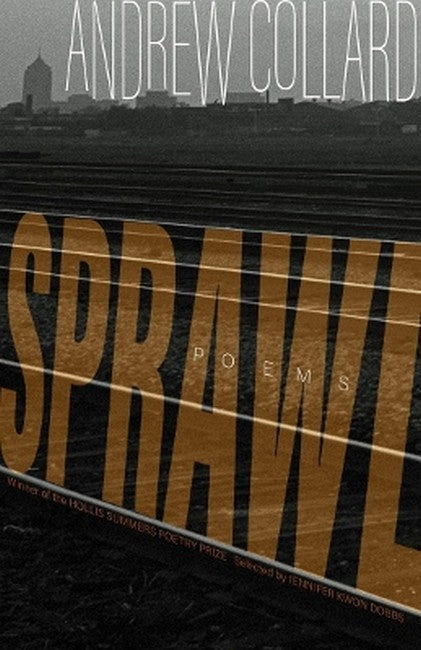Andrew Collard's poems have appeared in Ploughshares, AGNI, Virginia Quarterly Review, Best New Poets, and elsewhere. He currently lives in Grand Rapids, Michigan, with his son and their cats.
Request Academic Copy
Please copy the ISBN for submitting review copy form
Description
Diorama 1 Future Ruins Perpetual Motion 5 Quizzo Night at The Red Ox 7 Cicada Song 10 Pax Americana 11 Autotopia 13 Future Ruins 14 Wartime, Rally's Drive-In 17 Carried 19 Clippings: Sterling Assembly Plant 23 Where the Birds Went Crawling Backwards 27 The Nest 28 Unpunctuated Days 29 Elegy for the Dymaxion Car 31 Autotopia 34 They Say King's Forest Boulevard Is Healing 35 Sub-pastoral 37 After News of a Border Shutdown, I Venture Out for Fries 39 Clippings: Sterling Assembly Plant 43 Sprawl Gas & Food 47 Key Motor Mall 49 On the Demolition of Produce Kingdom 51 Telway Lament 53 Autotopia 56 Badlands Flashback 57 Night Music 59 Commute 61 Clippings: Sterling Assembly Plant 65 How to Be Held Church can be a word for anywhere 69 Landscape with Ryegrass and Hunger 71 Idyll 73 City of Windows 74 Night Cycle 77 Autotopia 78 To My Son Henry, Asleep in the Next Room 80 Dear leasing office, dear oil slick 82 Acknowledgments 85 Notes and Dedications 87
"'Because to name / a thing can be a way to claim it,' Andrew Collard writes in his stunning Sprawl, a poetic geography of the nation's heartland placed in a metropolitan Detroit that the poet presents as Autotopia, in the age of the Anthropocene that Detroit so mightily helped to create. Powerfully and precisely attentive, beautifully crafted to encompass the imaginative breadth of his witness and vision, Collard's poems provide us with indispensable 'field reports from the interior' with deeply articulate, heartfelt fury." "Andrew Collard's Sprawl refuses to shy away from the darkness yet is unafraid to acknowledge the strange beauties which whisper from the depths of fissures and the distances beyond peripheries. Collard captures complexities of contemporary life as the verse maintains its dichotomies, does not water down hardships nor loss. We explore a desperate sort of sadness, such as 'what it means that I am from here // but can't afford a home here.' Yet the work rejects didacticism, instead painting palpable landscapes, places in which we can immerse ourselves for contemplation. These poems zoom into and out from intimate moments, showcasing nuances of public and private topographies. This collection is a superb demonstration of the role of the modern writer as witness to their times." "I admired the poet's deeply felt intelligence alert to 'the way the pieces move.' The manuscript was an experience that gripped me from the beginning."

